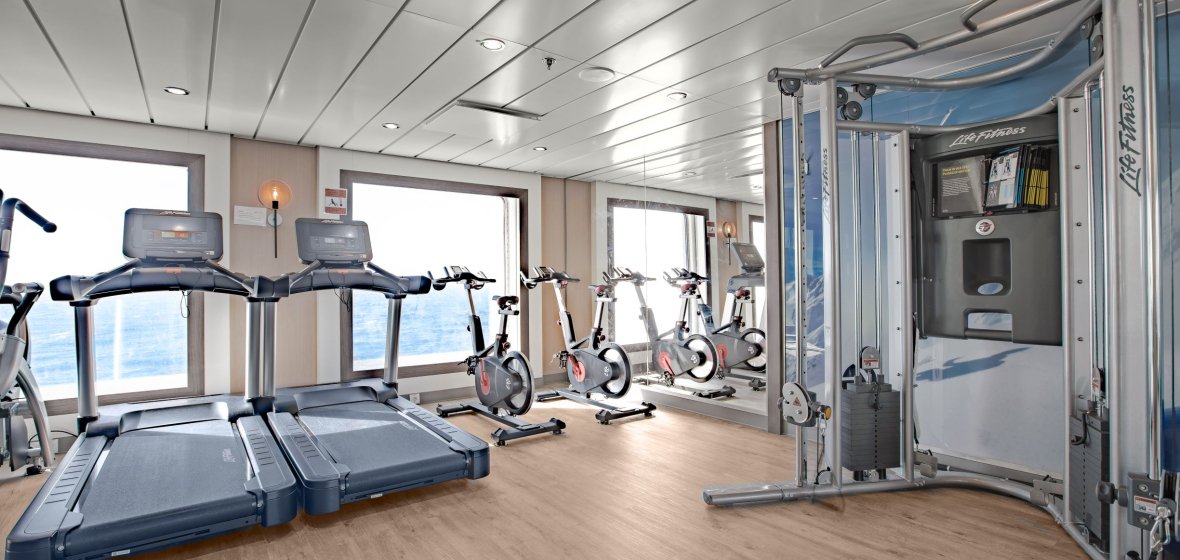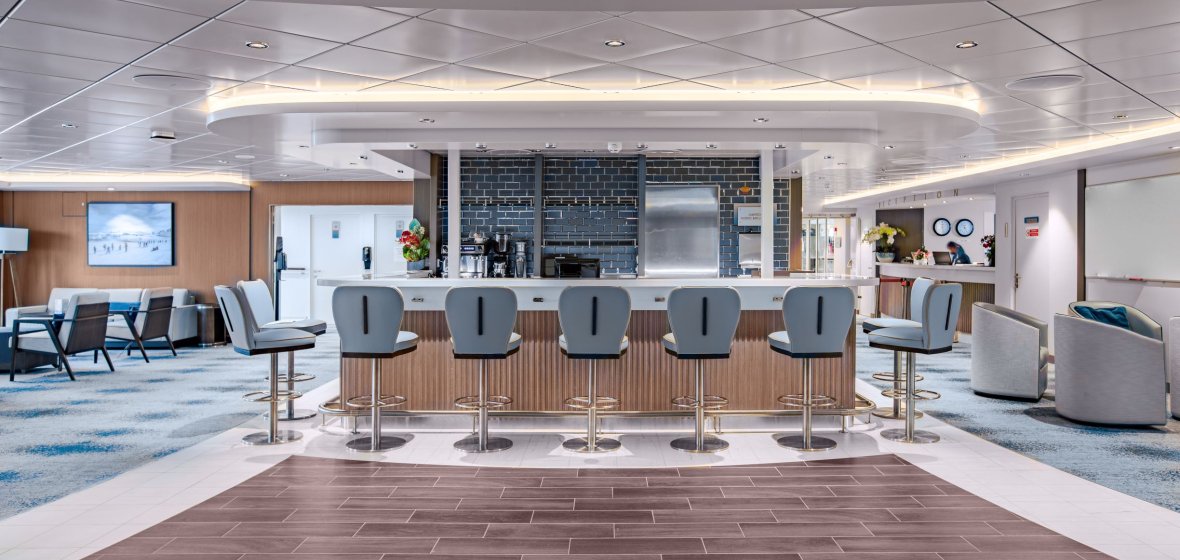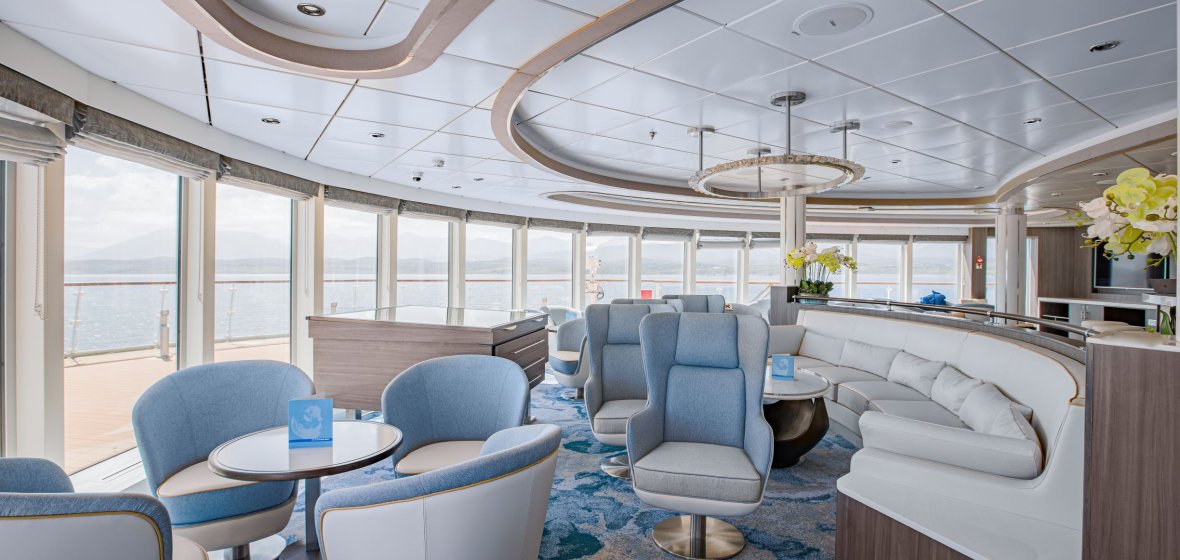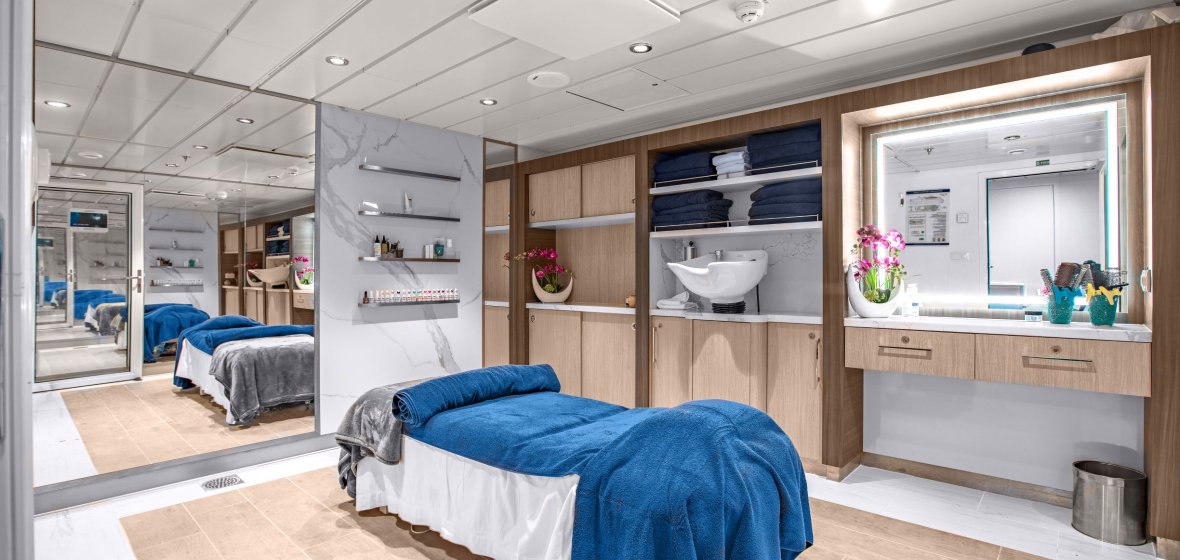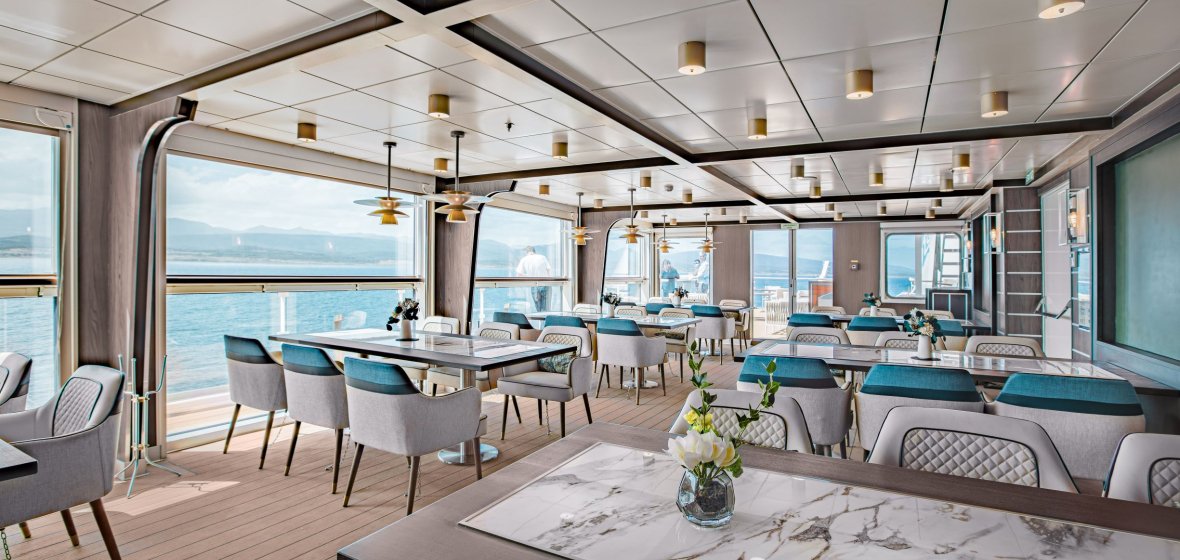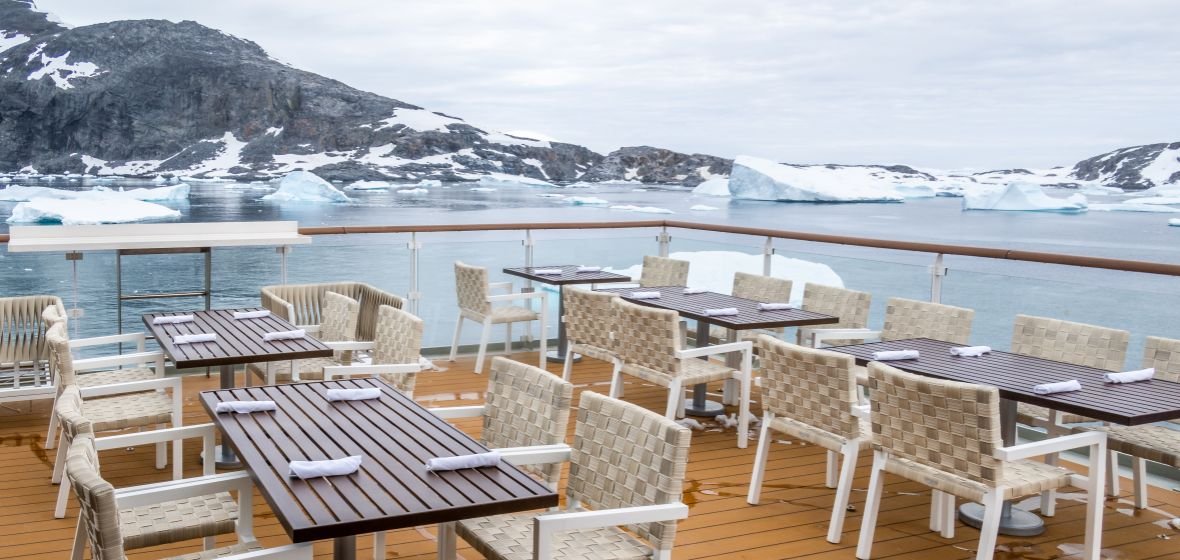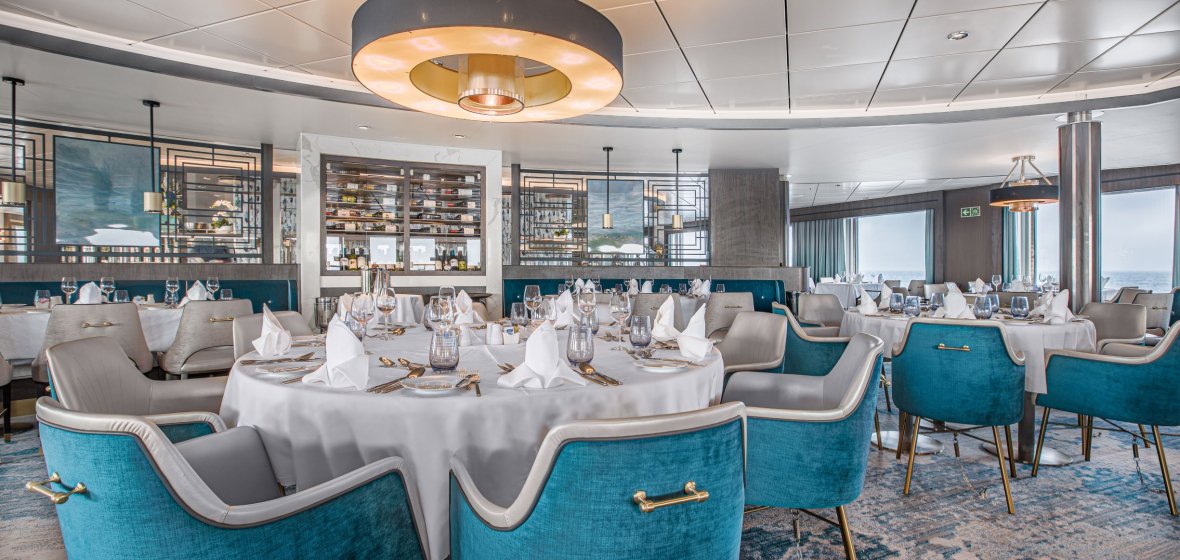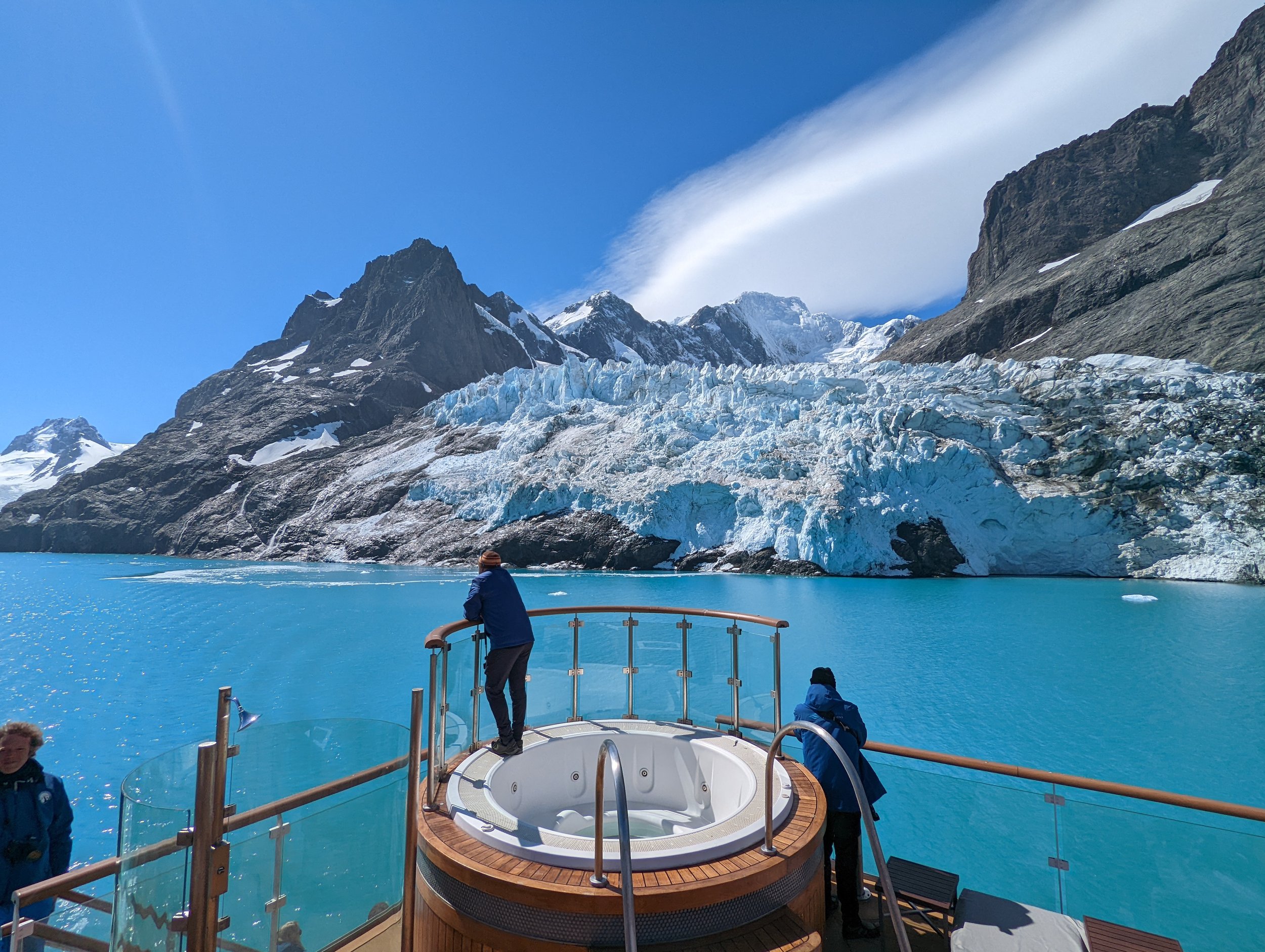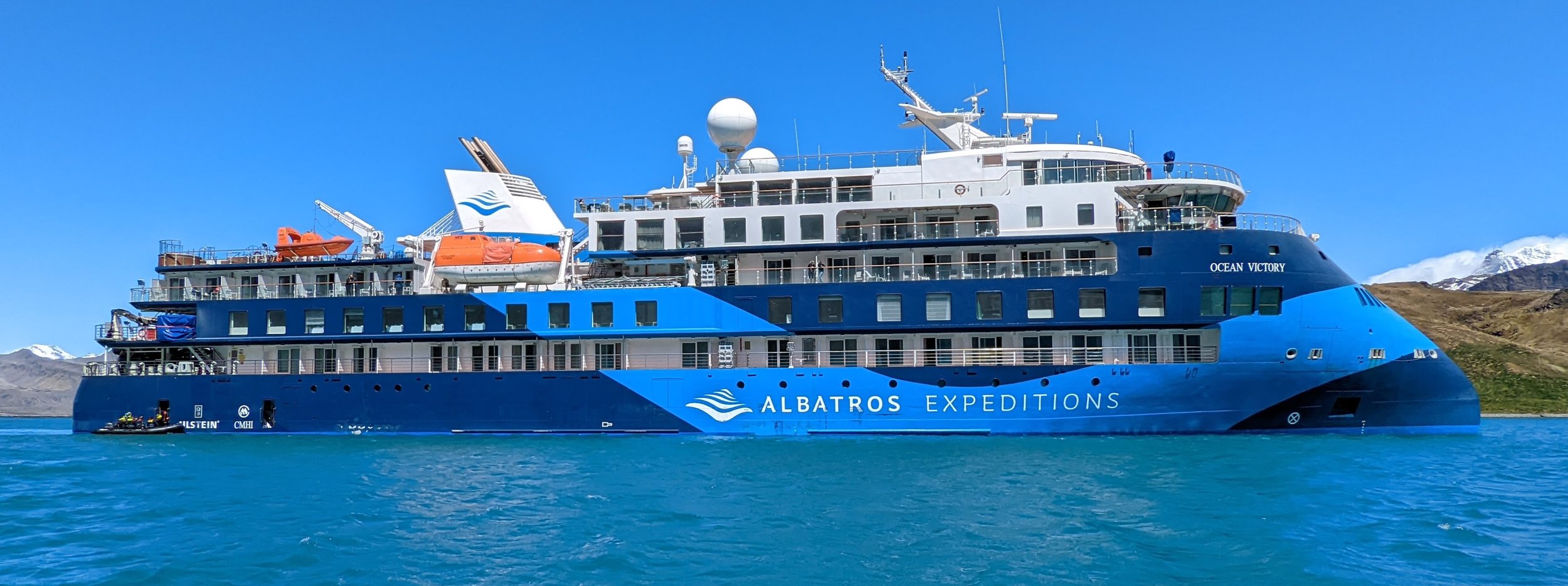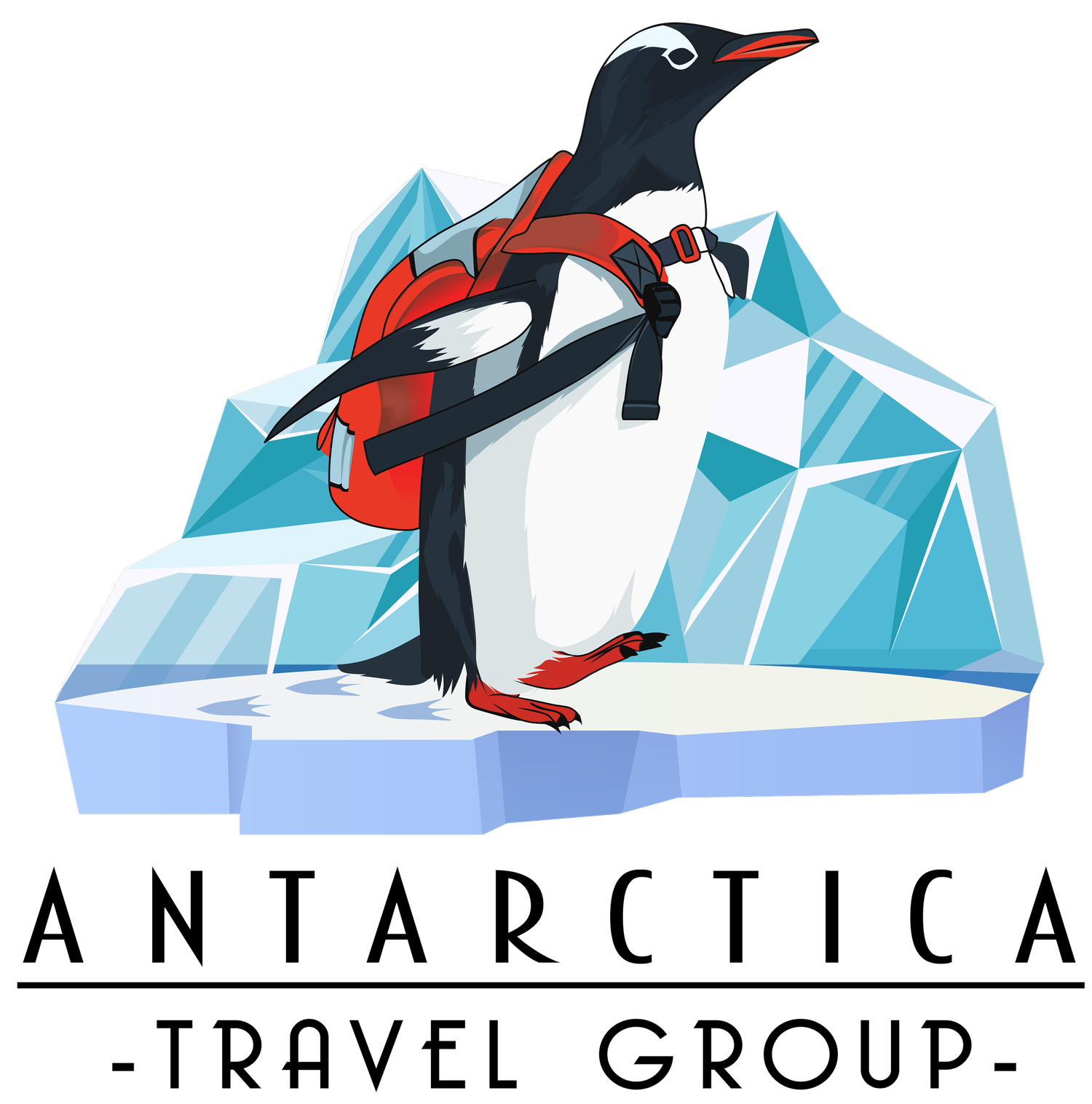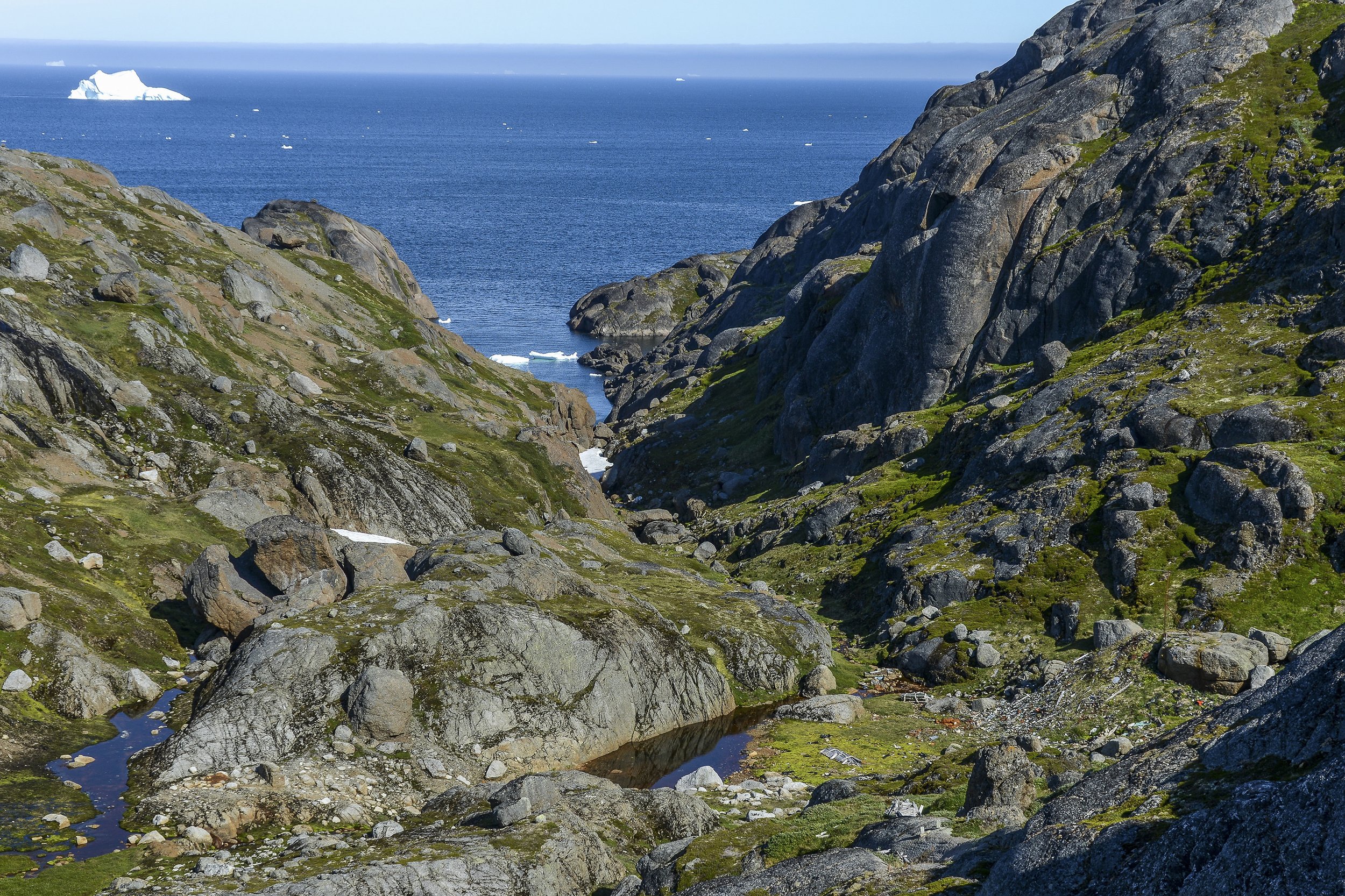
FROM ICELAND TO GREENLAND
Twelve days from Reykjavík to Kangerlussuaq aboard the State of the art X-bow Ocean Albatros, with Albatros Expeditions
Duration: 12 Days / 11 Nights
Itinerary: Greenland Explorer - From Iceland to Greenland
Departing/Returning: Reykjavík - Kangerlussuaq
Passengers: 176*
Ship name: Ocean Albatros
Departures:
July 29th, 2025 - August 9th, 2025
Dates and Details.
Trip Description.
New and updated route for 2025! Join us on an expedition cruise from Reykjavík to Kangerlussuaq, following the same maritime course set by Norse settlers over a thousand years ago. Experience the diversity of East, South and West Greenland, from the bustling mini-metropolis of Nuuk to the spectacular icebergs of Sermilik all in one unique voyage!
-
Day 1 - Reykjavík, Iceland
The rock-like columns of Hallgrímskirkja Church loom over the city of Reykjavík, a hip Scandinavian capital which needs little introduction. With new Nordic cuisine, excellent shopping, fantastic excursions and an easy relaxed vibe, Reykjavik is one of Scandinavia's most welcoming and exciting cities. Situated in the centre of the North Atlantic, Reykjavík is the perfect place to start Arctic adventures!
Our purpose-built expedition vessel awaits in the city's bustling harbour, awaiting to welcome our guests. After the madatory safety drill, enjoy dinner and a glass of champagne as we follow the thousand-year-old Norse sea route towards Greenland.
Day 2 - Crossing the Denmark Strait
As Norse explorers once did, we will cross the Denmark Strait from Iceland to Greenland. Days at sea are never dull. We will arrange a variety of activities onboard for our guests to enjoy to engage the mind, body and soul. Join your knowledgeable Expedition Team lecturers in the Theatre to hear specially-crafted lectures on local history, wildlife, geology, culture and more, unwind with a massage in the Albatros Polar Spa, or simply watch the seabirds gliding along with the ship from our hot tubs, as your expedition vessel flies across the Denmark Strait.
Day 3 - Tasiilaq, East Greenland
Our first port of call in Greenland is Tasiilaq, the largest settlement in East Greenland. Unlike the west coast, which has had uninterrupted contact with Europe since the 1700s, the coast of East Greenland remained more or less uncontacted until around 1894, when a Danish trading post was established at Tasiilaq. The vast distances involved in Arctic travel meant that the people of East Greenland (Tunumiit) were isolated from their cousins to the west, and the language, traditions and culture of East Greenland therefore differ significantly to those in other parts of the country.
Ancient traditions are strong here. This region of Greenland was the home of the last Angakkuit (Shamans) of Greenland, and is the home of the tupilak - a monster fashioned from animal (and sometimes human) body parts and animated by the power of an Angakkuq to wreak havoc on enemies. Creating such a monster was dangerous, as it could be turned back by a more powerful magic user to attack its creator. The first Europeans were curious as to what these dark beasts looked like, and locals carved facsimiles in bone or horn, beginning one of Greenland's finest artistic traditions. The tupilaat made by artisans in Tasiilaq are considered among the best in the country.
Tasiilaq sits in a perfect natural harbour on Ammassalik Island (meaning 'the Place of Many Capelin'). While superficially similar to towns on the West Coast, the landscape here is much more rugged, the people fewer, and the sled dogs much more numerous. Tasiilaq offers excellent opportunities to explore, with excellent hiking routes such as the Flower Valley easily accessible from town. For those wishing to delve into Tunumiit culture, visit the museum, located in the city's old church, hear the city's exquisite choir perform in the modern church, or watch a drum dancer in traditional East Greenlandic costume perform a millennia-old spiritual tradition. For those wishing to indulge in some retail therapy, visit the Stunk Artist's Workshop, where skilled craftsmen create beautiful pieces from natural local materials. Otherwise, hike up the hill towards the hotel to enjoy some of the best views anywhere in the country.
Day 4 - Ikateq and Kuummiut, East Greenland
In the morning, we will sail slightly eastwards towards Ikateq, a spectacular fjord with a fascinating history. During the darkest days of the Second World War, American forces established an airbase here (one of the network of air bases which includes Kangerlussuaq on the west coast) to serve as a stepping stone for aircraft transiting between Europe and North America. The rugged landscape of East Greenland meant the approach into the airport was hazardous, with frequent fog masking the treacherous mountains. Huge recources were invested into Ikateq Airbase (also known as Bluie 2 East), with a 5,000ft runway, hangar, barracks and port constructed. A fleet of military vehicles and thousands of barrels of fuel were also brought to this remote region. With Germany defeated, improvements to intercontinental aircraft, and increasing tensions with the Soviet Union, the United States Military abandoned the base in 1947, leaving almost everything behind.
The air base has been a bone of contention between Nuuk, Copenhagen and Washington for many years. Many in the Greenlandic government wanted the site cleaned up and the ruins removed; an expensive and logistically challenging task. Eventually, the Danish Government agreed to remove hazardous waste from the site (mainly decaying fuel drums), but leaving the rest of the equipment in place as an important part of regional history. Over 75 years later however, almost everything remains as it was on the day the Americans left. Ikateq is a truly unique place, a time warp to the Second World War: eerie, fascinating and surrounded by staggering natural beauty.
We will spend the afternoon in the small village of Kuummiut, which sits in breathtaking surroundings in the calm reaches of Ammassalik Fjord. Kuummiut - meaning 'People who Live by the River' - is one of the larger villages in the area, and one of the most prosperous. Sitting upon some of East Greenland's richest fishing grounds, Kuummiut holds the only fish factory in the region, and fishermen from miles around come through Ammassalik Fjord (which is wide enough to stay mostly ice-free year-round) to sell their catch here.
Kuummiut is an ideal place to experience life in an East Greenlandic settlement. Where other towns have traffic, Kuummiut has the yowling of sled dogs and the sigh of the wind through the grass. No roads lead in or out of this isolated village, and the sea is the highway for local transport - although motorboats have replaced the skin boats which brought people to these shores long ago. It is a perfect place to simply sit, watch the icebergs pass, and perhaps see the whales which often frolic in the calm waters offshore.
From Kuummiut, we will continue to navigate through the labyrinth of fjords, heading towards Sermilik.
Day 5 - Sermilik, East Greenland
Separating Ammassalik Island from the Greenlandic mainland lies the vast Sermilik Fjord. Sermilik is a typically descriptive Greenlandic placename, roughly meaning 'the Glacial Fjord' and it is no mystery why: this waterway is choked with vast icebergs, and surely ranks among the most spectacular natural wonders of the region. The icebergs here mostly originate at the vast Helheim Glacier, one of the largest glaciers in this icy country. The Helheim and other glaciers which empty into the fjord pour directly off the Greenland Ice Sheet, the edges of which can be seen to the east, rising thousands of metres towards the frozen core of this vast island.
The volume of ice will dictate our precise activities in Sermilikfjord, although options include coming ashore to marvel at the spectacular scenery and untouched nature of the area, or exploring on the water and marvelling at the natural ice sculptures of the area on a Zodiac cruise through the icebergs. Whatever we do, prepare to be amazed by the jaw-dropping beauty of this otherwordly place.
Day 6 - Skjoldungen, Southeast Greenland
Today's adventure begins as we sail into magnificent Skjoldungen, a staggeringly beautiful fjord on the southeastern coast of Greenland. The fjord is named for Skjold, an ancient Danish King of legend, while the Greenlandic name, Saqqisikuik, references the sunny climate of the area. Various archaeological finds on the island which sits in the middle of the fjord suggests nomadic Inuit groups visited and stayed in the area in years gone by; more recently, settlers were brought from Tasiilaq to settle the island in the 1930s, but returned there thirty years later;some houses can still be seen on the southern side of the fjord. A small weather station was also operated on the island by the Allies during WWII.
Today uninhabited, Skjoldungen sits almost 300km from the nearest village, with Mother Nature its only ruler. Vast saw-toothed mountains lined with opalescent glaciers line the deep chilly waters of the fjord, which can freeze even in summer. At the head of the fjord lies the magnificent Thryms Glacier, a magnificent river of ice flowing down from the ice sheet. On the southern side of Thryms Glacier lies the sweeping U-shaped glacial valley of Dronning Maries Dal - a textbook example of a glacially-produced landscape. Join your expedition team for a walk on the flower-lined floor of this valley, and marvel at the stunning scenery. Ensure you are on the outer decks on our approach and departure from this magnificent fjord too: you will not be disappointed!
Day 7 - Prins Christian Sund and Aappilattoq
South of Skjoldungen lies Kap Farvel, or Cape Farewell, which is renowned not only as Greenland's southernmost point, but also for its infamously challenging weather, which commonly features large swells and gale-force winds.
With this in mind, we deliberately opt for a far more comfortable but also more spectacular route, cruising via the inside passage of Prins Christian Sund. Known in Greenlandic by it's typically descriptive name of Ikerasassuaq ('the Big Strait'), this 60 km long waterway reaches from the entrance on the southeastern coast of Greenland to the small village of Aappilattoq, connecting the Labrador and Irminger Seas.
Prins Christian Sund is one of the most spectacular waterways anywhere on Earth. Kept free of ice year round by strong tidal currents, the strait is hemmed in on either side by mountains which rise straight out of the water some reaching over 2,000m in height. Large glaciers flow from the ice sheet into the sea on the northern side of the strait, while sapphire blue mountain glaciers loom over the water from the southern side, and vast icebergs stud the glassy waters.
In the afternoon, we will approach the small village of Aappilattoq, which sits hunkered beneath the towering mountains at the end of Prins Christians Sund. The village is a world away from busy Tasiilaq or even Kuummiut; life here moves at a slower pace, following the rhythms of the wind, waves and tides. Aappilattoq (meaning 'Red' in Greenlandic, referring to the stark granite bluffs above) offers excellent hiking opportunities, and the local choir is renowned throughout Greenland.
DAY 8 - Qassiarsuk and Itilleq Kujalleq
During the early morning, Ocean Albatros will sail through the majestic mountains of Tunulliarfik Fjord towards the small beach of Itilleq. The southern fjords of Greenland offer a very different environment to the chilly north and east of the country. Situated at roughly 60°N, this region is level with northern Scotland or southern Scandinavia, with a climate to match. Here, the weather is calm, stable and humid, with much warmer summers and milder winters than the rest of the country. In place of rocky hillsides, the fjords here are lined with lush green meadows and dotted with small sheep-farming settlements, of which Qassiarsuk and Igaliku are perhaps the best known.
Coming ashore in the morning at the sheltered bay of Itilleq, a farm trail beckons us to the village of Igaliku. During the morning, we will trek through the lush green hills to see the remains of the Norse Bishop's palace at Garðar - once a place of great power and influence in this remote corner of the Norse world.
During the afternoon, we will reposition to the other side of the fjord to the sheep-farming village of Qassiarsuk. While the modern village was founded in 1924, the location has a fascinating and much longer history; it was here that legendary Norse explorer Eric the Red settled after being banished from Iceland. He named the land he discovered 'Greenland' to encourage other settlers to follow him - a marketing ploy that has stood for over a thousand years!
Erik the Red settled in this green landscape and set up a small farmstead in typical Norse style, naming his new home 'Brattahlíð'. Erik himself kept fiercely to the Norse gods, but his wife Thjodhild was a Christian. Legend has it, she refused to join his bed until he built her a church, which he eventually did, constructing a tiny hut (Þjóðhildarkirkja) which was nevertheless the first church in the Americas (although he refused to have it within view of his house).
The Norse settlers in Greenland stayed for almost 500 years, but disappeared from all historical records in the early 1400s. Whether some plague or famine struck them, or whether deteriorating climate simply forced them to return to Scandinavia remains a topic of lively debate. Today the outlines of buildings (including Erik's house, Thjodhild's church and the Bishop's palace) can be seen, along with stunningly accurate reconstructions of Eric's farm, where modern Inuit farmers continue to raise sheep to this day. A statue of Erik now overlooks the area, commemorating the first European to reach the Americas, and whose son Leif would be the first European to reach Baffin Island and Newfoundland. Sites rich in fascinating history and culture old and new, the settlements of Brattahlíð and Garðar are today part of the Kujataa UNESCO World Heritage Site.
DAY 9 - At sea, en route to Nuuk
From South Greenland, we will follow the rugged coast of this vast island northwards. All settlements in Greenland (with the exception of Kangerlussuaq) are situated directly on the ocean coast of the country, and the vast majority of residents (some 50,000 or so) live on the narrow strip of coast on the west of the country, facing the Davis Strait.
Ocean currents bring warm water up from the Atlantic to the west coast, enriching these wildlife-filled waters. During our day at sea, keep your eyes on the sea! Whales, seals and a huge variety of seabirds are common in these rich waters.
Day 10 - Nuuk, Capital of Greenland
A mixture of skyscrapers and traditional wooden houses, the quaint and the cosmopolitan, Nuuk is a city of contrasts. The vibrant bustling capital of Greenland, Nuuk feels much larger than it’s 19,000 inhabitants, and offers a wealth of experiences to visitors. The calm fjords around Nuuk have been inhabited by Paleo-Inuit cultures since at least 2200BCE, and archaeological evidnece indicates waves of migration through the area as ancient hunters followed migrating prey. Around the year 100CE, Norse colonist from Iceland etablished the Western Settlement in the green meadows of Nuuk Fjord; these settlers mysteriously disappeared several hundred years later leaving the island to the Inuit, who were far better equipped to live in Greenland's harsh environment.
The next Scandinavian to visit the area was Hans Egede, the controversial Danish missionary who 'rediscovered' Greenland, founding Nuuk as Godthåb ("Good Hope") in 1728. Danish initiatives to modernise Greenland in the 1950s left a significant mark on Nuuk. While they brought significant improvements to the city's infrastructure, the many large apartment blocks in the city attest to rapid (and sometimes haphazard) urbanisation. In 1979, the Home Rule Act created the Greenlandic Parliament (Inatsisartut), and proclaimed Nuuk the capital. The city's population continues to rapidly grow, with new suburbs being constructed beneath Ukkusissat, the mountain which looms to the east of the city.
Nuuk offers a huge amount to the discerning visitor; larger than any other city in Greenland, Nuuk has a bustling cosmopolitan vibe, and hosts some of Greenland's best attractions. Swing by Kolonihavn district to visit the Greenlandic National Museum, a treasure trove of history stretching back to the first inhabitants of this icy island - including artefacts from the Paleo-Inuit and Norse periods, as well as the spellbinding Qilakistoq mummies. Explore Greenlandic culture at Katuaq, the city's cultural centre and an architectural marvel; shop for authentic Greenlandic artworks in the city's many boutique shops, or simply relax at a hip curbside café with a Greenlandic coffee and watch this vibrant city in action. Nuuk York (as proud locals call it) is unlike any other city in Greenland, or indeed the world.
Day 11 - Kangaamiut and Evighedsfjorden
On the last full day of our expedition, we will arrive at the small village of Kangaamiut, an incredibly picturesque settlement in Greenland’s central Qeqqata region. Surrounded by cold rich waters and a vast back country brimming with game, life in Kangaamiut moves at a slower pace, and locals still live a largely traditional lifestyle, surviving by hunting and fishing. Hike to the heliport atop the hill for stunning views over the town and the surrounding fjordlands, or meet the friendly local people during a display of traditional clothing, foods, and seal-flensing. The artists of Kangaamiut are well-known throughout Greenland, and some of the locals' most splendid work can be viewed in the town's small museum.
In the afternoon, we will sail inland into Evighedsfjorden/Kangerlussuatsiaq, one of the many deep fjords carved between the steep mountains of this region. The Danish name 'Evighedsfjorden' means 'The Eternity Fjord', referring to the vast size of the inlet, while the Greenlandic name 'Kangerlussuatsiaq' translates as 'The Rather Large Fjord' - something of an understatement! Evighedsfjorden stretches around 100km into the glacier-clad mountains, bisecting the large ice cap which overlies much of the land between Nuuk and Sisimiut - Greenland's two largest cities. We will aim to explore on a Zodiac cruise in front of the Evigheds Glacier, which flows into the fjord from the Maniitsoq Ice Cap above. Watch for calvings from the glacier, and guillemots and kittiwakes on the nearby bird cliffs.
Day 12 - Kangerlussuaq, Disembarkation
During the night, we will sail up the 160-kilometer/100 mile Kangerlussuaq Fjord. After breakfast aboard the ship, we will bid a fond farewell to the ship's crew, Expedition Team and fellow travelers before shuttling ashore by Zodiac. Due to Kangerlussuaq’s military history and present-day role as an important air travel hub, the town remains fairly isolated from Greenland’s rich cultural traditions, in comparison to other regions. While you still find cultural experiences when visiting Kangerlussuaq, the most impressive attraction is the surrounding nature, which is just beckoning to be explored. The town itself was largely constructed by the American military in the 1950s, and this small airport town has retained something of its Cold War atmosphere. Your Arctic adventure and time in Greenland concludes as we arrive at the sleek modern airport terminal - with memories to last a lifetime.
-
Shore excursions:
Landings are a great opportunity to stretch your legs and set foot on shore to visit the towns and cities of Greenland and experience Arctic nature first-hand. Our experienced Expedition Team will be on shore to help you spot any wildlife, identify the different species of birds and mammals, guide you through Greenlandic settlements, as well as keep our guests safe on shore from any potential hazards.
We remind our guests that Greenland is a truly wild destination, to consider their physical capability when travelling in the country. In smaller towns and villages, infrastructure for tourism may be less well developed than in other destinations. Most smaller towns and villages lack step-free access, and roads and paths can often be steep and uneven.
Zodiac cruises:
Some sites do not offer landing opportunities, but are locations where exploring on the water offers the best opportunities for sightseeing, wildlife and photography. These Zodiac cruise sites are often known for their concentration of ice, wildlife and even historical landmarks such as Inuit or Norse ruins, where our fleet of Zodiacs offer the best vantage point. This would be the only scenario you may have to wait on the ship (other than in adverse weather conditions), but we will always aim to offer an onboard program during this time, such as seminars given by our knowledgeable and experienced Lecturer team. Zodiac cruises are great for observing icebergs, glaciers, whales, and other marine wildlife. Your skilled driver will navigate around the area looking for wildlife and beautiful landscapes. By the end of the voyage, Zodiac cruises tend to become a firm favourite among our guests because of the vast diversity of scenery and marine life it is possible to experience.
Ship Cruises:
In the event we encounter bad weather or are in a particularly spectacular location, often our purpose-built expedition vessels are the best viewing platform. The Captain and Expedition Leader will search for locations best accessed with the vessel to seek out the best wildlife and scenery. We encourage everyone to bundle up and either head onto the outer decks with the Expedition Team or relax in superlative comfort in our specially-designed lounges to experience the majesty of the Arctic from the best vantage point. During this time, our Expedition Team specialists will offer skillfully-crafted lectures related to the wildlife, history, culture and conservation of the region, and more!
After leaving the Icelandic capital of Reykjavik, your expedition vessel will proceed onwards into Greenland to explore the unknown. The goal for the days spent exploring in Greenland is to offer activities which will allow everyone to explore off the ship as much as possible, and experience the nature, settlements and culture of Greenland in person.
Our activities in Greenland will vary widely according to the nature of the locations we visit – some larger settlements need an entire day to explore, whereas some smaller villages can be seen in a few hours. Greenland is Earth’s largest island, and on any itinerary in this region, travel time between destinations can be significant. Activities we offer include landings, Zodiac cruises and ship cruises. Regulations in Greenland limit the number of people ashore at any time at certain natural and historical sites, so we will usually aim to offer a Zodiac cruise while our first group of guests are ashore, and reverse this for the second group ashore to maximise exploration time where numerical limits apply. In towns and cities where the environment is less sensitive, there are no limits on numbers of people ashore. No matter the day’s planned activities, the onboard Expedition Team and Expedition Leader will work as hard as possible in conjunction with the Captain and Crew to maximize exploration opportunities.
A “typical” expedition day in Greenland may look like this (subject to weather and sea conditions and sailing schedule):
0645: Wake-up call
07.00-08.00: Breakfast
08.30-11.30: Morning activity – arrival in port at anchor, Zodiac ashore to explore Greenlandic settlements, historical sites etc. Depending on the location, we may spend the whole day in port.
12.30-13.30: Lunch onboard
1430-17.30: Afternoon Activity – Either in connection with the morning, or at a different site, depending on itinerary
18.30-1930: Evening Recap with Expedition Team
19.30: Dinner
* All activities are subject to weather, scheduling and timing.
-
INCLUSIONS
12-day/11-night cruise on Ocean Albatros in a shared outside double stateroom with a private bathroom in the category chosen
Flights between Kangerlussaq - Copenhagen via Keflavik and Group Transfer between Kangerlussaq Airport and the vessel. Value: USD 650/pax
English-speaking expedition staff
Near-port walks with the expedition team
Nature hikes and Zodiac cruises per itinerary
Information briefings and lectures by the expedition team
Special photo workshop
Full board on the ship
Dinner drink package
Free coffee, tea, and afternoon snacks on the ship
Welcome and Farewell cocktails
Taxes, tariffs, and landing fees
Digital visual journal link after the voyage, including voyage log, gallery, species list, and more
EXCLUSIONS
International flights
Extra excursions and activities not mentioned in the itinerary
Single room supplement and cabin upgrades
Meals not on board the ship
Beverages (other than coffee and tea and dinner-drink package)
Tips for the crew (we recommend USD 16 per person per day)
Personal expenses
Transfer to the ship in Reykjavik
Travel, cancellation, and senior insurance
Anything not mentioned under ’Inclusions’
-
A deposit of 25% is required to hold your spot within 14 days of being invoiced and final payment is due 90 days before departure. Payment can be made via bank transfer or debit and credit card. Cards accepted are Visa or Mastercard.
Voyage Map.
The expedition cruise begins in Reykjavík, heading to East Greenland with stops at Tasiilaq, Kuummiut, Ikateq, and the stunning Sermilikfjord. From there, the journey continues to Skjoldungen Fjord, Prins Kristiansund, and Kap Farvel before exploring the lush landscapes of South Greenland, including Brattahlíð (Qassiarsuk) and Igaliku. The adventure then follows Greenland's coastline to Nuuk, the vibrant capital, and concludes with visits to Kangaamiut and the breathtaking Eternity Fjord.
Available Add-on Activites
-

Kayaking
Kayaking is booked and paid for onboard the Ocean Albatros, after you’ve attended the mandatory Kayak safety briefing.
$345 per person/per outing.
-
Will we get off the ship?
Yes!!! Once we arrive in Svalbard it will be the ultimate goal of the Captain, Expedition Leader, and the Expedition Team to make sure we get off the ship as much as possible. You’ll participate in landings, zodiac cruises, and any additional activities you’ve signed up for. Check the “Detailed trip itinerary” below for more details on each outing.
*Pending weather.
-
Are there additional taxes and fees?
The price shown is the "all-in” price after all taxes, fees, port fees, and permits required; which are handled by the tour operator. The only main additional costs will be mandatory travel insurance, optional gratuity, canned beverages and alcohol, and additional activities. See the full list of inclusions/exclusions for more.
-
Do I pay extra if I'm a solo traveler?
Not necessarily, no! Our trips are usually made up of around 50% solo travelers! Prices are always per person, per bed. If you’re a solo traveler, we will match you with a same-gender roommate from our group to share your cabin with. There is also the option for solo cabin availability on certain trips. Please send us a message about solo cabins if that’s your preference.
All prices are per person and include all taxes, fees, port fees, accommodation and meals.
Please refer to the full list of inclusions and exclusions for more details.
SAVE UP TO 50% ON SELECTED CABINS
Pricing
Cat E - Twin French Balcony
These cabins offer a double-sized bed and the possibility of a full-sized sofa bed. Located on deck 7. The room features a large floor-to-ceiling, wall-to-wall window, where the top half of the window slides down completely. - Ensuite
$13,845
$7,248
Cat C - Twin Balcony Cabin
A spacious balcony cabin that is offered on deck 4 and deck 6. These cabins offer a large walkout private balcony.
This option is available as a matrimonial bed.
$14,145
$7,398
Cat C Superior - Twin Balcony Cabin
A spacious balcony cabin that is offered on deck 4 and deck 6. These cabins offer a large walkout private balcony.
The beds can be configured as two twins or a matrimonial bed. This option is available for solo travellers who wish to share a cabin.
$14,845
$7,398
Cat F - Triple Porthole
Located on deck 3, these cabins offer three lower twin beds, or a queen bed with a single bed. These are large cabins that are great for a group of traveling friends, solo travelers, and families. - Ensuite
$9,945
$6,227
Cat D - Twin Porthole Cabin
These twin portholes are located on Deck 3. They offer a large sitting area and a round porthole in each cabin. These cabins can be configured to offer two twin beds or one matrimonial bed. - Ensuite
$12,745
$6,698
Cabins may vary and may not be exactly as depicted. Please consult the deck plan and contact your booking agent for further information.
Ship Details.
The Ocean Albatros, sistership to the Ocean Victory, will join the fleet of Albatros Expeditions in May 2023.
Currently, it is the highest-rated ice-class ship built to date. It was also awarded “the most environmentally friendly ship to operate in the polar regions”.
This expedition vessel platform was designed for exploring Antarctica. The unique Xbow design offers speed and stability that is unmatched by other expedition cruise vessels.
The Ocean Albatros carries 176 passengers and can max at 190.
-
BRIDGE
Due to its important role as a control center for all nautical and technical processes, the ship's bridge is a vital, sensitive place. Therefore, the bridge may not be accessible to the public at all times. Conditions permitting, we will be happy to welcome you into the bridge for a visit. Guests must be accompanied by the master or our expedition leader.
JACUZZIS AND SWIMMING POOL
The ship features two jacuzzis and an infinity swimming pool on the upper outside deck (deck 7), allowing spectacular views of the polar landscape outside in a relaxing environment.
* Please note, there is no lifeguard on duty, the pool and jacuzzis will not be accessible if weather and wind conditions render them unsafe to use. The weather in polar regions is typically not suitable for infinity swimming pool use. It is to be expected that the use of these facilities will be on certain calm days and within certain hours, so if you plan on using them, please confer with the expedition staff onboard. The jacuzzis (hot tubs) can normally be used much more frequently and whilst the ship is moving.STATEROOM SERVICE
Your stateroom is serviced daily. We provide a turn-down service. -
ZODIAC LANDINGS
One feature of our expedition cruises includes landings and excursions aboard Ocean Victory's fleet of 18 inflatable, motorized rubber "Zodiac" boats. The Zodiac brand has earned a well-deserved reputation as the sturdiest and safest small watercraft available. These boats have a low draft and great stability. Zodiacs are constructed for professional use and are outfitted with a top-quality outboard engine, yet their design minimally impacts the environment.
The Zodiacs are designed to provide unrestricted access to the world’s last great frontier. Their versatility enables us to make landfall on remote shores, cruise along awe-inspiring coastlines, and share breathtakingly close encounters with whales, seals, penguins, seabirds, and more.
Your safety and comfort are our #1 priority, and your expedition leader will carefully plan for as many Zodiac excursions as possible, dependent upon the local weather and prevailing conditions. In each case, the expedition leader makes the final decision if the landing is possible or not. Safety regulations apply on landings. All guests receive mandatory instruction on the safety guidelines. Life jackets are mandatory to wear.
Please note, that we highly recommend the use of waterproof bags in order to protect your personal camera or binoculars, as both hands must be free of everything during boarding. Participation is fairly easy and comfortable for able-bodied guests but can be more challenging for those with physical handicaps.
CRUISE CARD / PAYMENTS / CREDIT CARDS
At the time of embarkation, you will receive your personal cruise card, which you should always have with you. This card is used on board as payment instrument and identity card. All on-board purchases from the boutique, bar, internet, telephone, laundry, and the like are charged to your shipboard account.
To activate your personal onboard account, we accept Visa, MasterCard, and American Express credit cards. At the end of the voyage, your account will be settled by the payment methods mentioned above.
There is no currency exchange office onboard the vessel. Onboard payment will be completed by your cruise card.
If you choose to leave a gratuity for the crew, the amount that you authorize will be charged to the shipboard account. Be sure to contact your credit card provider regarding the use of your credit cards overseas. Any questions regarding the bill can be addressed to the Reception.
GRATUITIES
Following international standards in the service industry, it is customary to leave a gratuity for the ship’s crew at the end of the voyage. All gratuities will be divided among the crew. Typically, the recommended amount is approximately 13.50 USD per person per day. Gratuity is, of course, not required and any gratuity payments are voluntary.
If you choose to leave a gratuity for the crew, the amount that you authorize will be charged to the shipboard account.
DRESS CODE
The dress code on board is casual. It is more important to wear the right clothes in order to adapt to the different weather conditions. We recommend comfortable, breathable, waterproof, and windproof clothing. Also, you should have a pair of gloves, thermal underwear, and sturdy footwear in your luggage. For the captains and farewell cocktail, we recommend a smart casual dress style.
ENVIRONMENT
As a tour operator for cruises in the Polar Regions, which are some of the world’s most pristine environments, we extremely emphasize environmental awareness as well as sustainability. One of our top priorities is to protect the environment and minimize our CO2-emissions. All waste will remain onboard the vessel until we return to shore and it's possible to dispose of waste.
We ask that you show a deep respect for the unique nature and act according to the motto: leave nothing but footprints, take nothing but memories.
INTERNET / PHONE
Keep in mind, that we will be cruising in a very remote region of the world. Where accessible, internet access is available for an extra charge. Mobile phone reception may be possible in select regions along our route. For further details please contact your mobile phone operator. Prices can be found in the information folder in your stateroom. Please ensure that your ‘Data Roaming’ function is switched off.
LANGUAGE ONBOARD
The official language aboard our vessels is English; however, our expedition leaders and crew are knowledgeable in a variety of languages. If there is a large group, who desires communication in their own language, we will make special arrangements to accommodate their needs.
PASSPORT / VISA
Each guest is responsible for ensuring that he/she meets the applicable passport and visa requirements for the duration of the trip. The passport is the only valid proof of identity for all trips with the Ocean Victory. Your passport must be valid for a minimum of 6 months after arriving home from your destination. Although some countries may require shorter periods, we implement this 6-month prerequisite to avoid situations where a country’s validity requirements may be amended between the time of your booking and departure. The name in your passport must be identical to the name in all travel documentation. Costs incurred due to insufficient travel documents are the responsibility of the passenger.
Please note that passports will be collected for clearing formalities at the beginning of the voyage. The passports will be kept safely by the Purser during the whole voyage and will be handed out on the last day. We, therefore, recommend preparing copies of all documents before you start your travels.
RECEPTION
The daily office hours of the board reception are from 06:00 until 23:00.
ALBATROS OCEAN BOUTIQUE
The selection of items available for purchase varies by ship and may include a range of warm and practical clothing, as well as souvenirs, local arts, and postcards at reasonable prices. A small selection of soap, toothpaste, and other toiletries are also sold.
AVAILABLE SEATING SPACE
Shackleton Lecture Room: 185
Nordic Lounge: 50
Beagle Restaurant: 166
Beagle Specialty Restaurant: 40
Observation Lounge: 67
Panorama Specialty Restaurant: 46
HEALTH / MEDICAL EMERGENCY
Each of our vessels has a small medical facility equipped with the necessary equipment and medicine to handle small emergencies. The infirmary is always staffed by a professionally licensed, English-speaking physician. Should a serious incident occur, the nearest hospital will be contacted. All guests must have personal travel/health insurance.
Although we do not have an official requirement regarding personal fitness, you should be able to move on board and ashore without the help of others.
Due to safety reasons, a cruise is only possible for pregnant women until the 24th week of pregnancy. The state of pregnancy must be presented by a medical certificate.
SAFETY / SECURITY ON BOARD
Our ships comply with all safety regulations and are ice-class vessels suitable for sailing in polar environments. Upon arrival to the vessel, there will be a mandatory passenger briefing and safety drill before departure. We will provide security information, and practical details regarding life onboard and introduce key personnel. You will be informed where the safety equipment is located and how it is used. Each stateroom is equipped with lifejackets. Once onboard, please familiarize yourself with the ship's emergency rescue plan.
PHYSICAL DISABILITIES / WHEELCHAIR ACCESSIBILITY
The Ocean Victory has two cabins available to guests requiring wheelchair access. Guests needing any form of assistance, and those who are physically disabled must be accompanied by someone who will take full responsibility for any needed assistance during the cruise and in the event of an emergency.
Moreover, guests requiring a wheelchair must provide their own collapsible wheelchair. Please be aware that some ports of call, shore excursions, docks, gangways, and other requirements may preclude a wheelchair-bound guest from leaving the vessel; that decision will be made by the Expedition Leader or ship’s captain and is binding.
SEASICKNESS / STABILISATORS
The ship is equipped with stabilizers in order to reduce the ship’s roll. However, these expeditions are hosted in remote regions, and it is possible to periodically encounter changing environments and climate patterns, including rough seas and large swells. Seasickness medication work solely or in part to help cure nausea for most people. These medicines can cause sleepiness. If you are prone to motion sickness, consult with your doctor prior to departure to help ensure your comfort while travelling.
SMOKING
For safety reasons and to protect the health of our guests and employees, smoking is only allowed in designated areas on the outside decks. Smoking is not permitted inside the vessel, in the stateroom or near the Zodiacs. Please remember to respect our natural environments and dispose of cigarette butts in designated bins.
SPECIAL DIETARY REQUESTS
All meals on board the vessel is chef-prepared. If you have special dietary requirements (food allergies, intolerances, health conditions or religious preferences), please inform us as early as possible - ideally, no later than 2 weeks before departure. In order to ensure efficient service, please re-confirm your requirements with the crew upon boarding the ship.
ELECTRICAL OUTLETS
The ship has a 220v / 50 Hz cycle system. Please check your appliances before use. 110-volt appliances require an adapter prior to use aboard the ship.
The electrical outlets on board Ocean Victory are the so called ‘F-type sockets’, round 2-pin, 220-240 V, grounded, used in continental Europe and Russia. They take C, E, and F-type 2-pin plugs.
WATER
There are several water stations onboard Ocean Victory. Normally, water is not rationed, but we do advise our guests to pay attention to their water consumption.
LAUNDRY
If you wish to have some laundry done while aboard the ship, laundry service is available for an additional fee.
ONBOARD BRIEFINGS
The Expedition Leader will conduct regularly scheduled briefings to highlight key points in the itinerary, organize excursions and communicate important information.
CHILDREN
Due to safety precautions, children under 12 years of age will be taken into consideration on each landing. It is entirely at the Expedition Leader’s discretion to permit children on excursions and shore landings.
ITINERARY & PROGRAM CHANGES
As this is an expedition cruise to the world’s most remote region, we are at the mercy of Mother Nature. We have planned itineraries for each tour package, but to ensure to safety of our guests and crew, we may be forced to change the route.
RULES FOR LANDINGS & EXCURSIONS
When ashore, it is very important to show a deep respect for the unique nature and act according to the motto: leave nothing but footprints, take nothing but memories. We also ask that you remain together with your group, as we are truly in the wild and must remain extra vigilant of the wildlife and weather conditions around us. Walking around independently is strictly prohibited. It is essential to abide the strictly communicated safety rules.
